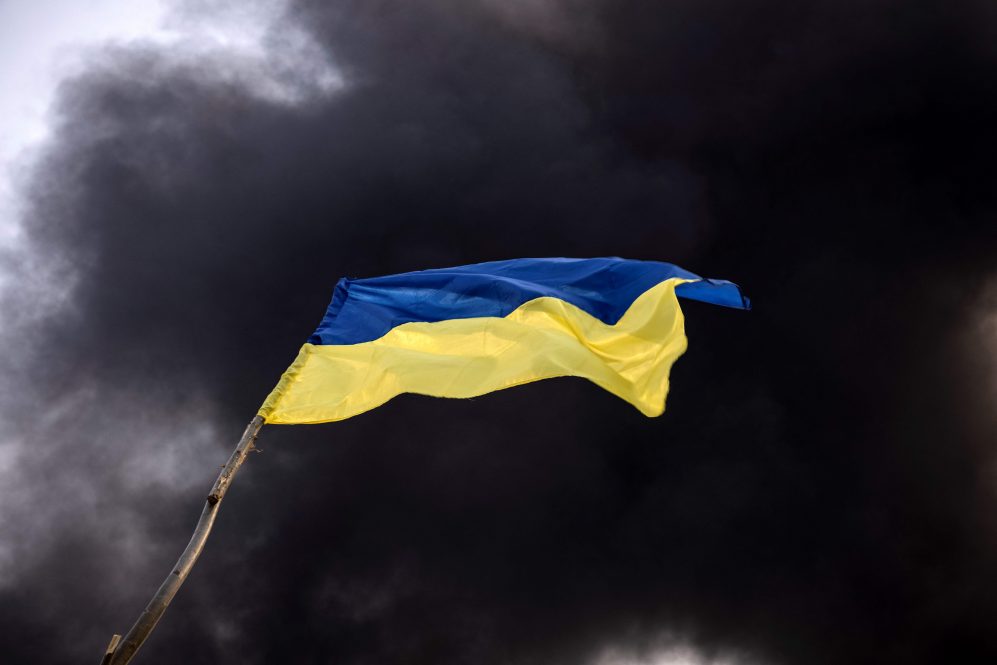With Ukrainian surrender and Russian withdrawal both unlikely, the war grinding into its second month in Eastern Europe could end with a brokered settlement – or lead to an escalation involving other countries, according to a UConn alumnus who went on to become a high-ranking US foreign policy official.
“Do you believe that this could be a historic moment for change in the world?” asked Daniel Fata ’94 (CLAS), former Deputy Assistant Secretary of Defense for Europe and NATO, who spoke to an audience at the Konover Auditorium on March 21. “It depends how the war ends. Will democracies still be a model, or are they going to be replaced with something else? Will this moment determine whether the post-World War One and World War Two international institutions are still relevant to meet the challenges of the 21st century? We have to wait and see.”
In his remarks, Fata drew parallels between the politics of today and when he attended UConn in the early 1990s. Then, the Cold War had ended after the collapse of the Soviet Union, but now, with Russia’s invasion of Ukraine, old fears and anxieties are resurfacing, with the war possibly setting stage for other conflicts or even a reimagining of democracy itself.
“Global politics are increasingly polarized, and with disinformation and misinformation running rampant when you put this all together, it is toxic for policymakers, for students, for citizens,” said Fata. “A lot of what we need to do as citizens and students is figure out where do we go from here.”
How We Got Here
To better understand the war in Ukraine, Fata said, we must look back to the Munich Security Conference attended by world leaders in 2007, which the UConn alum attended as part of the US delegation.
The annual conference is a meeting between world leaders discuss policies related to trans-Atlantic and European security. By 2007, NATO – the military alliance of European and North American nations formed in the aftermath of World War II – was expanding its membership and plans for a missile defense system were in the works for Eastern Europe. These plans and policies were viewed as threats by Russian President Vladimir Putin.
Putin used the meeting as an opportunity to air his grievances, where Fata says the Russian leader ranted for 45 minutes, framing the United States as a superpower breaking all international norms and rules. Putin argued the US was illegally placing troops in Eastern Europe, and that the proposed missile defense system was poised to be used against Russia. Then Putin focused his rant on European nations, saying they followed the US like sheep.
“This was a warning,” Fata said. “NATO expansion would not be tolerated, and Putin drew a line and said the worst thing that ever happened geopolitically was the collapse of the Soviet Union and the Russian Empire, and he was determined to restore Russian pride.”
The ensuing flurry of working groups and meetings proved fruitless, and it was clear, as everyone walked out of that hall that day, that Europe was divided. Eastern Europe was scared, and for good reason — they knew Putin had his eyes on them, Fata said.
Tensions mounted further at the NATO summit in Bucharest, Romania in 2008, where the allies were divided on whether to grant Ukraine and Georgia partial, “one-step” NATO membership through the Membership Action Plan (MAP), or if they should apply fully, said Fata. Leaders settled on language that said Ukraine and Georgia would not join NATO in 2008, but would one day become members.
“At that point, leaders didn’t understand we should be taking Putin seriously. Military action against Ukraine, and Georgia was just inconceivable. The language created a grey area, and left those two countries in an ambiguous situation as to what the US would do to help them,” Fata said.
Later that year, Russia invaded Georgia, and then annexed Crimea, part of Ukraine, in 2014. Though economic sanctions were imposed by Western governments after 2014, military action remained off the table.
“We left those two countries in a place where there’s ambiguity, and the sense that we don’t really care,” said Fata.
What Could Happen Next
Intelligence analysts and others agree there are four likely scenarios for how the war develops from here, Fata said.
“One option is a brokered settlement, and I think this is the most likely option,” Fata said. “A second option is Ukraine surrendering. Third, is Russia withdrawing. The fourth is the conflict gets bigger.”
After several failed rounds of talks, Fata does not see either a Ukrainian surrender or Russian withdrawal happening.
“In theory, there’s some room for brokered settlement. No one will get everything they want,” Fata said.
Then there is the possibility the war could escalate further, and Fata thinks this could happen if China decides to formally get involved on behalf of Russia, and the US and NATO decide to provide direct military support to Ukraine.
At this point, Putin sees the war as a combination of avoiding further humiliation and of sticking to his original, core argument raised in 2007, Fata said.
“He knows the allies aren’t going away. I think ‘scorched earth’ is something that, in his mind, doesn’t come with negative consequences.”
As far as China getting involved, Fata said, “I think the biggest thing that could see Chinese involvement is if there were pre-emptive economic sanctions against China to deter them from supporting Russia financially.”
“We’re going to see Great Power competition start,” he said. “Other countries can take lessons from this.”
The war could also give us a glimpse of how other conflicts will be waged in the 21st century, citing examples like heavy use of drones in combat, stepped-up cyberwarfare, and the expanded use of satellites.
In terms of cyberwarfare, Fata said that so far it appears to be primarily waged by hackers siding with the Ukrainians, targeting financial interests rather than infrastructure or military defense. Loosely organized groups not formally affiliated with states could become a regular feature of cyberwarfare, Fata said, calling that a troubling prospect.
“I think there’s going to be a lot of cyberwarfare rules changing,” he said. “I’m far more scared of cyberwarfare, [because] you may not be controlling the person that’s doing it.”
What Can We Do?
Fata said that, while this moment is challenging, it also presents us with opportunities to reassess the value of democracy and its role in the world.
“Don’t be passive,” he said. “Shape your own future and shape your country’s democracy. Help create the world you want. You have so much power at your fingertips. Through our devices, people can have their voices heard. That’s both a blessing and a curse.”



